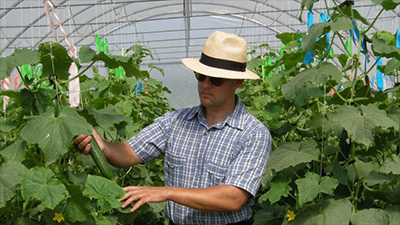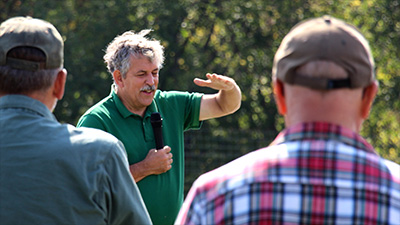Two Cornell projects were recently featured on the Northeast Sustainable Agriculture Research and Education Program‘s Dig Deeper online feature:

High tunnels for winter greens – Cornell Vegetable Specialist Judson Reid used a Northeast SARE grant to research and document pest and disease management in high tunnels using biological controls and biorational pesticides on winter crops like spinach, kale, pak-choi, chard, and mustard. Target pests included caterpillars, slugs, aphids, and thrips, and diseases like downy mildew and rot. Reid and his research team also looked at varietal susceptibility to these disease and insect pressures.
Twenty growers agreed to take part in a case-study component designed to build their scouting, pest identification, and cultural control skills through regular contact with the project team; this contact also helped farmers understand action thresholds and how to use cultural control strategies with more precision. This one-to-one interaction had real impact—as one farmer in Allegany County put it, “The regular contact with Cornell Cooperative Extension project personnel gave me access to a great resource—someone who was always willing to discuss all ag-related questions.” Read more.

Analyze this: Professional development for berry production – The rising cost of inputs and the environmental impacts of fertilizers provide new impetus for taking a whole-farm approach to berry crop nutrient and soil management. However, agricultural service providers, who are frequently on the front line for advice and assistance with berry crop soil and nutrient problems, often feel ill-equipped to address farmer concerns and promote beneficial practices; no single, comprehensive resource on this topic has been available for either educators or growers.
This two-year project, led by Dr. Marvin Pritts, Cornell University small fruit horticulturalist and berry crop nutrition specialist, aimed to bridge this gap by training a cadre of 50 educators across the Northeast. The performance target was that 15 educators would develop and deliver outreach programs reaching 150 berry growers who manage a total of 750 acres of berry crops, with 50 growers going on to conduct soil, nutrient, and soil health testing; these growers would get one-on-one help interpreting test results, and would implement analysis-based fertilization and soil health management practices on their farms. Read more.


